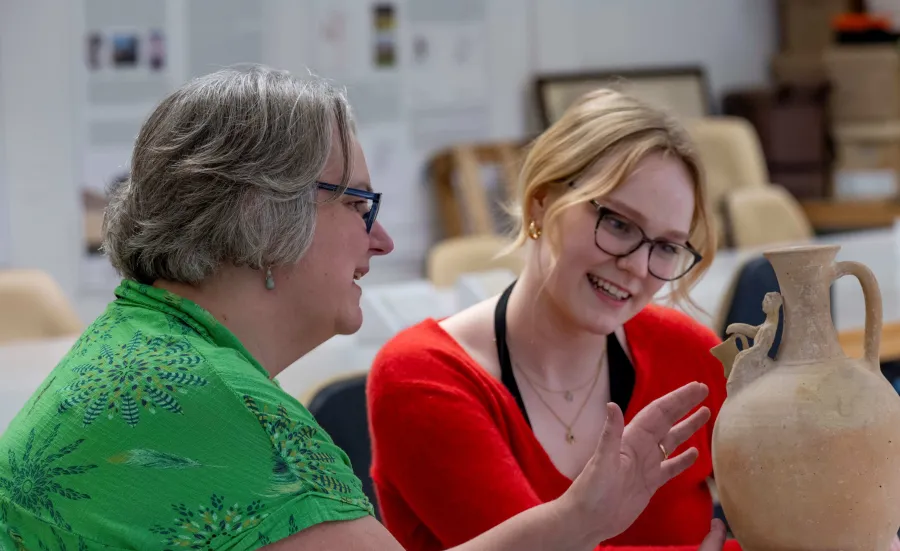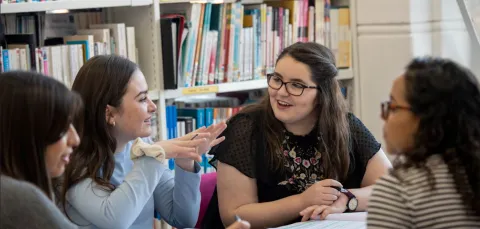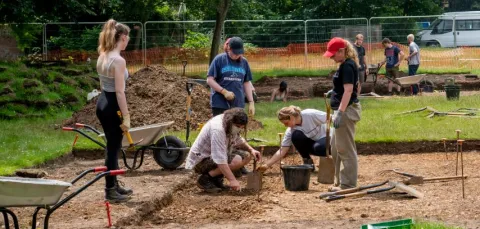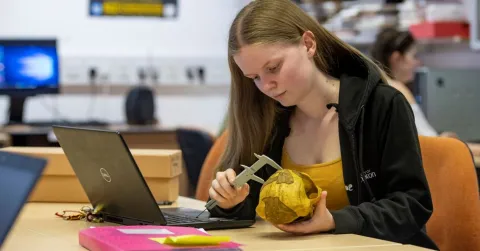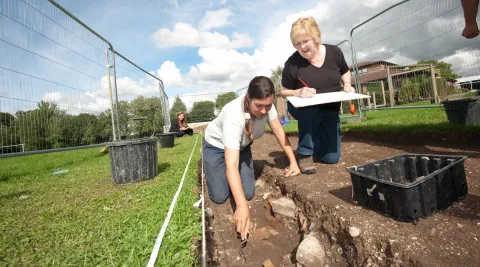About this course
Learn about the ancient world and find ways to understand the foundations of how we live today. On BA Archaeology and Ancient History, you'll develop specialist knowledge in your chosen areas of study and learn in an engaging and supportive research environment. Your research and archiving skills will prepare you for further study, or for a variety of career options. These include heritage management and archaeological research.
Studying archaeology and ancient history will give you an insight into both subjects and you'll be able to explore the topics that interest you through optional modules.
You'll have the choice of a wide range of historical topics, from Ancient Egypt to the rise of Islam in the Middle East. You can also learn what happened during the conquests of Alexander the Great and at the end of the Roman Empire.
The complementary subject of archaeology is the study of the human past through its material remains. These include buildings, monuments, artefacts, biological remains, written sources and landscape. On this ancient history and archaeology degree you can:
- learn from experts in the ancient world (including history, archaeology, ancient and modern languages and literatures, philosophy and film)
- use cutting-edge technology to discover and map new sites, or develop research skills
- do at least 3 weeks of field work, including excavating archaeological sites or collecting archaeological material from ploughed fields
- challenge yourself by learning Latin and Ancient Greek
We regularly review our courses to ensure and improve quality. This course may be revised as a result of this. Any revision will be balanced against the requirement that the student should receive the educational service expected. Find out why, when, and how we might make changes.
Our courses are regulated in England by the Office for Students (OfS).
Learn more about these subject areas
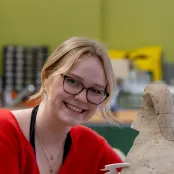
I had the amazing opportunity to volunteer at a Bronze Age site in Hungary during the summer of my first year as part of the required fieldwork. Over 3 weeks I developed my skills while meeting other students and volunteers from all over the world.
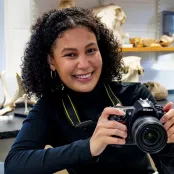
I got to solidify knowledge I already had from being at Southampton, whilst trying new things outside my degree. I always knew I wanted to have a year abroad, and Malta definitely did not disappoint.

My favourite aspect of the course is the ability to dive into ancient religions and civilisations immediately from the beginning. You can combine both the origins of humanity and the development into the Middle Ages at the same time.
Course location
This course is based at Avenue.
Awarding body
This qualification is awarded by the University of Southampton.
Download the Course Description Document
The Course Description Document details your course overview, your course structure and how your course is taught and assessed.
Entry requirements
For Academic year 202627
A-levels
ABB
A-levels additional information
Offers typically exclude General Studies and Critical Thinking.
A-levels with Extended Project Qualification
If you are taking an EPQ in addition to 3 A levels, you will receive the following offer in addition to the standard A level offer: BBB and grade A in the EPQ
A-levels contextual offer
We are committed to ensuring that all applicants with the potential to succeed, regardless of their background, are encouraged to apply to study with us. The additional information gained through contextual data allows us to recognise an applicant's potential to succeed in the context of their background and experience. Applicants who are highlighted in this way will be made an offer which is lower than the typical offer for that programme.
International Baccalaureate Diploma
Pass, with 32 points overall with 16 points at Higher Level.
International Baccalaureate contextual offer
We are committed to ensuring that all learners with the potential to succeed, regardless of their background, are encouraged to apply to study with us. The additional information gained through contextual data allows us to recognise a learner’s potential to succeed in the context of their background and experience. Applicants who are highlighted in this way will be made an offer which is lower than the typical offer for that programme.
International Baccalaureate Career Programme (IBCP) statement
Offers will be made on the individual Diploma Course subject(s) and the career-related study qualification. The CP core will not form part of the offer. Where there is a subject pre-requisite(s), applicants will be required to study the subject(s) at Higher Level in the Diploma course subject and/or take a specified unit in the career-related study qualification. Applicants may also be asked to achieve a specific grade in those elements. Please see the University of Southampton International Baccalaureate Career-Related Programme (IBCP) Statement for further information. Applicants are advised to contact their Faculty Admissions Office for more information.
BTEC
RQF BTEC
Distinction, Distinction, Merit in the BTEC National Extended Diploma or Distinction, Distinction in the BTEC National Diploma plus B in an A level or Distinction in the BTEC National Extended Certificate plus AB from 2 A levels.
We are committed to ensuring that all learners with the potential to succeed, regardless of their background, are encouraged to apply to study with us. The additional information gained through contextual data allows us to recognise a learner’s potential to succeed in the context of their background and experience. Applicants who are highlighted in this way will be made an offer which is lower than the typical offer for that programme.
Additional information
The University aims to recruit students from a wide range of backgrounds who we believe have the potential and motivation to succeed on our challenging programmes. We are committed to fair admissions and strive to ensure we give equal consideration to all applicants who possess the necessary knowledge and skills.
QCF BTEC
Distinction, Distinction, Merit in the BTEC Extended Diploma or Distinction, Distinction in the BTEC Diploma plus B in an A level or Distinction in the BTEC Subsidiary Diploma plus AB from 2 A levels.
BTEC contextual
We are committed to ensuring that all learners with the potential to succeed, regardless of their background, are encouraged to apply to study with us. The additional information gained through contextual data allows us to recognise a learner’s potential to succeed in the context of their background and experience. Applicants who are highlighted in this way will be made an offer which is lower than the typical offer for that programme.
Access to HE Diploma
60 credits with a minimum of 45 credits at Level 3, of which 30 must be at Distinction and 15 credits at Merit.
Access Offer Contextual
We are committed to ensuring that all learners with the potential to succeed, regardless of their background, are encouraged to apply to study with us. The additional information gained through contextual data allows us to recognise a learner’s potential to succeed in the context of their background and experience. Applicants who are highlighted in this way will be made an offer which is lower than the typical offer for that programme.
Irish Leaving Certificate
Irish Leaving Certificate (first awarded 2017)
H1 H2 H2 H2 H3 H3
Irish Offer Contextual
We are committed to ensuring that all learners with the potential to succeed, regardless of their background, are encouraged to apply to study with us. The additional information gained through contextual data allows us to recognise a learner’s potential to succeed in the context of their background and experience. Applicants who are highlighted in this way will be made an offer which is lower than the typical offer for that programme.
Scottish Qualification
Offers will be based on exams being taken at the end of S6. Subjects taken and qualifications achieved in S5 will be reviewed. Careful consideration will be given to an individual’s academic achievement, taking in to account the context and circumstances of their pre-university education.
Please see the University of Southampton’s Curriculum for Excellence Scotland Statement (PDF) for further information. Applicants are advised to contact their Faculty Admissions Office for more information.
Cambridge Pre-U
D3 M2 M2 in three principal subjects
Cambridge Pre-U Offer Contextual
We are committed to ensuring that all learners with the potential to succeed, regardless of their background, are encouraged to apply to study with us. The additional information gained through contextual data allows us to recognise a learner’s potential to succeed in the context of their background and experience. Applicants who are highlighted in this way will be made an offer which is lower than the typical offer for that programme.
Welsh Baccalaureate
ABB from 3 A levels or AB from two A levels and B from the Advanced Skills Baccalaureate Wales
Welsh Baccalaureate additional information
Offers typically exclude General Studies and Critical Thinking.
Welsh Baccalaureate contextual offer
We are committed to ensuring that all learners with the potential to succeed, regardless of their background, are encouraged to apply to study with us. The additional information gained through contextual data allows us to recognise a learner’s potential to succeed in the context of their background and experience. Applicants who are highlighted in this way will be made an offer which is lower than the typical offer for that programme.
T-Level
The following T levels are accepted: Agriculture, Land Management and Production; Design, Surveying and Planning for Construction; Craft and Design; Science
Other requirements
GCSE requirements
Applicants must hold GCSE English language (or GCSE English) (minimum grade 4/C) and mathematics (minimum grade 4/C)
Find the equivalent international qualifications for our entry requirements.
English language requirements
If English is not your first language, you must show that you can use English to the level we require. Visit our English language pages to find out which qualifications we accept and how you can meet our requirements.
If you are taking the International English Language Testing System (IELTS), you must get at least the following scores:
IELTS score requirements
- overall score
- 6.5
- reading
- 6.0
- writing
- 6.0
- speaking
- 6.0
- listening
- 6.0
If you do not meet the English language requirements through a test or qualification, you may be able to meet them by completing one of our pre-sessional English programmes before your course starts.
You might meet our criteria in other ways if you do not have the qualifications we need. Find out more about:
- our Ignite your Journey scheme for students living permanently in the UK (including residential summer school, application support and scholarship)
- skills you might have gained through work or other life experiences (otherwise known as recognition of prior learning)
Find out more about our Admissions Policy.
Mature applicants
We welcome applications from learners of all ages. Students who are aged 21 and over at the start of their undergraduate course are defined as mature by the University of Southampton. We take a holistic assessment of the application looking for academic ability and commitment to study. Typical entry requirements, which may vary from discipline to discipline, includes for example, evidence of recent formal academic qualifications or professional qualifications, relevant work experience or volunteering. You may also be invited to attend an interview with an Admissions Tutor. For some degree programmes, there may also be a Professional, Statutory and Regulatory Body (PSRB) requirement. We accept many different academic qualifications. For more information, please contact the Admissions Team.
Got a question?
Please contact our enquiries team if you're not sure that you have the right experience or qualifications to get onto this course.
Email: enquiries@southampton.ac.uk
Tel: +44(0)23 8059 5000
Course structure
In your first year studying archaeology and ancient history, you'll focus on discovering the nature of archaeology and ancient history and the relationship between these two disciplines.
In year 2 you'll enhance your knowledge of the human past and study historical and archaeological methodology. In your final year, you'll specialise in the study of selected periods, regions or themes.
You'll also be able to broaden your experience beyond ancient history and archaeology by choosing:
- interdisciplinary modules or modules from another subject
- language modules, Latin or ancient Greek
- to study abroad for a semester
You do not need to choose your modules when you apply. We'll guide you through the process before you start.
Year 1 overview
Compulsory modules will give you an introduction to the ancient world and to archaeological fieldwork and analysis.
You'll also be able to choose optional modules. These include topics such as human origins, death in the ancient world, and debates in archaeological science.
Year 2 overview
You'll deepen your understanding of archaeology with at least 3 weeks of practical experience in a field school or research project in the UK or overseas.
You'll delve deeper into the issues and debates surrounding contemporary archaeology, as well as examining professional and academic practice in archaeology.
Optional modules include studies of:
- bones, bodies and burials
- myths of the ancient world
- scientific diving
Year 3 overview
You'll be able to follow your interests and complete a research project and dissertation on either ancient history or archaeology. This is an opportunity to demonstrate your planning, research, analysis, and communication skills. You'll also show how you engage with primary source materials.
You can choose from specialist module options, including:
- the Emperor Julian
- Ancient Egypt
- molecular archaeology
Want more detail? See all the modules in the course.
Modules
The modules outlined provide examples of what you can expect to learn on this degree course based on recent academic teaching. As a research-led University, we undertake a continuous review of our course to ensure quality enhancement and to manage our resources. The precise modules available to you in future years may vary depending on staff availability and research interests, new topics of study, timetabling and student demand. Find out why, when and how we might make changes.
For entry in academic year 2026 to 2027
Year 1 modules
You must study the following modules in year 1:
Ancient Sources in Context
The history of the ancient world is hugely significant for understanding subsequent periods of history and the origins of ideas and institutions of global significance. However, the nature of the ancient world continues to be highly debated due to the sou...
Archaeological Methods for Fieldwork and Analysis
How do archaeologists find sites, gather data and proceed to make sense of archaeological traces? This module provides a detailed introduction to fieldwork methods and analysis, covering site prospection techniques (e.g., aerial photography and geophysica...
Fieldwork and Practice
Fieldwork is an integral part of the archaeological process. Whether through excavation or survey, it is one of the primary means by which archaeological data is generated. It is essential that students gain some experience of fieldwork in order to: devel...
Introduction to Historical Archaeology
In a common analogy where the c.4.5 billion years of Earth's geological history are equated to a 24-hour day - modern humans appearing only within the last 4 seconds - written human history begins only in the last 100 milliseconds. That time, though, saw ...
Introduction to the Ancient World
The Ancient World has profoundly influenced subsequent generations of history, and helps us to understand the foundations of today’s world. This module provides an introduction to this momentous period of history from Dark Age Greece to the emergence of I...
Thinking Through Things: the archaeology and anthropology of material worlds
Being human involves an inseparable relationship with things, both made and found. People make things, as things make people, and to envisage a human being who is not in some way formed by the objects they use, wear, live in, venerate or trust in is incon...
You must also choose from the following modules in year 1:
Applied Ethics
In both public and private life, we face difficult and pressing ethical questions every day. Should we give a proportion of our wealth to those in developing countries? Should we allow doctors to perform abortions or euthanasia and, if so, under what circ...
Debates and Issues in Archaeological Science
The application of scientific techniques is increasingly embedded in archaeological studies and is an area where the UK currently leads the world. Techniques such as dating methods, the use of isotopes to reconstruct past diet or human migrations and the ...
From Constantine to Theodosius: Christians, Pagans and Emperors
The 4th century CE was a time of upheaval and change. Christianity became established as the state religion of the Roman empire, the split between the eastern and western empire was cemented, and the first large group of Goths crossed the Roman border. In...
Human Origins
The investigation of human origins has been described as the intellectual romance of the social sciences. This module examines the changing ideas about our earliest ancestors and the evolution of hominin culture and biology and explores the links between ...
Introduction to Ethnography: Food and Culture
Biological science tells us what items in our world are potentially edible, but culture decides what constitutes food. Culture informs us as to whether a specific item is appropriate, appetising, valued, desirable, prohibited, restricted, staple or medici...
Landscapes and Seascapes of Britain’s Past
The landscapes and seascapes of Britain play host to one of the world’s most varied and intriguing archaeological records. With an occupational history spanning one million years, it tells a complex inter-twined story of social, physical and environmenta...
Latin 2
‘Latin 2’ is designed to build on the knowledge acquired by students who have taken ‘Latin 1’, but may also be appropriate for those with some previous alternative experience (e.g. a GCSE). The module will equip you with the ability to read, comprehend, a...
Literary Transformations
Why have some stories gripped the imagination of writers, musicians, and artists across cultures and centuries? And what does the emergence and constant re-emergence of such stories tell us about ourselves and others, past and present? What do readers and...
Masada: History and Myth
The Dead Sea fortress Masada was the last stronghold of resistance to Roman rule in Judea. Following the outbreak of revolt against Rome (66) and the fall of Jerusalem to the soldiers of the Roman emperor Vespasian (70), the fortress was finally taken in...
Puzzles about Art and Literature
Both individuals and society attach great importance and value to certain works of art, including poems, novels, films, plays, symphonies, and paintings. Most of us spend a considerable amount of our limited time and resources acquiring, creating, experie...
Year 2 modules
You must study the following modules in year 2:
Contemporary Issues and Debates in Archaeology
Contemporary archaeology operates within a broad remit: its traditional focus on understanding a deep past is now supplemented by studies of more recent material cultures, and issues of heritage, representation and the politics of the past. All of these d...
Fieldwork and Practice
Fieldwork is an integral part of the archaeological process. Whether through excavation or survey, it is one of the primary means by which archaeological data is generated. It is essential that students gain some experience of fieldwork in order to: devel...
Humanities Study Abroad Preparation Module
This module will prepare you for study abroad and also take you through the application process for study abroad. Before you travel, you are required to take out appropriate insurance policies and engage in on-going monitoring of risk and this module will...
Making History: Historians and Audiences
History has a life which stretches far beyond the ivory tower of academia and university study. This module encourages you to reflect on how historians translate academic knowledge into public history. It introduces you to the many different audiences for...
Year Abroad Report Module for Humanities Students
This non-credit bearing module is a required element for all Humanities students on a Year Abroad Programme. It builds on the Year Abroad preparation module, HUMA2012. It is taken as a long thin single module whilst on the Year Abroad with a two hour prep...
Year in Employment
The Year in Employment (YiE) is an opportunity for undergraduate students across a range of programmes to undertake a placement year whilst remaining enrolled to the University of Southampton. Students complete their placement after their second year of s...
You must also choose from the following modules in year 2:
Aesthetics and the Philosophy of Art
You might watch a stunning film, hear a delightful song, enjoy a beautiful sunset, read a dreadful poem, attend an elegant dance, or see a garish building. Experiences like this can stimulate thoughts and feelings of great depth, and provide pleasure or d...
An Anthropology of Everything
"The Anthropology of Everything" aims to guide students in developing engaged thinking about the various forms of anthropological knowledge production. Serving as a bridge between social and cultural anthropology, archaeology and biological anthropology ...
Ancient Greek Philosophy
Philosophy has always progressed by being aware of its past, and it has been said that the legacy of the ancient Greek thinkers to Western philosophy is nothing less than Western philosophy itself. The ancients invented our subject, and Plato and Aristotl...
Ancient Greeks at War
From the legendary tales of the Trojan War up to the conquest of Persia by Alexander the Great, warfare played a central role in ancient Greek history and society. This module allows you to examine ancient Greek warfare from a range of different sources a...
Ancient Rome: the First Metropolis
This module focusses on the city of Rome and its development from its early foundation through to the third century AD. It explores the evidence for one of the most important cities of the ancient world, which at its height was home to approximately a mil...
Animal Ethics, Animal Minds
Human treatment of animals has always been a major ethical question, and one that is gaining increasing public attention. We use and interact with animals in a variety of contexts that can have a significant impact on their lives and wellbeing. This modul...
Bones, bodies and burials: osteology and comparative anatomy
This module examines the variation within the mammalian skeleton from an evolutionary and functional perspective. Additionally, it gives an overview of the main methodological and theoretical issues in the retrieval, treatment and interpretation of bone f...
Corpus Linguistics: Working with large-scale text data
In this module, we introduce corpus linguistics as an approach to and method for analysing large-scale text data. We will develop an understanding of building and curating datasets, annotating data, and using quantitative and statistical measures for lang...
Data Environmentalism
Data is material. It is produced by people, it is made possible by resource extraction, it needs power to survive, it inhabits and resculpts the landscape. The use of data, then, contributes to climate catastrophe, but that role can be hard to see, hidden...
Data, Culture, and Justice
Data organise our present and shape our future. Those data are never neutral because they are the product of human labour, of choices made by people about what data to record, how to record it, and who is best equipped to do that recording. Drawing on wor...
Ethics of Global Poverty
Ethics of Global Poverty examines the duties of affluent people towards those living in poverty around the world. Among the questions we will examine are: What obligations do we have to help strangers in need? What bases might such obligations have? Are s...
How the Arts Work: A Practical Introduction to Cultural Economics
How are the arts getting back to work again after Covid-19? This is a critically important question for everyone who cares about them, artists and audiences alike. If you’re a student considering a career in the arts you’ll want to know where fresh opport...
Imperial China: From China’s mythical emperors to the 19th century
This module will discuss Chinese history from its mythical beginnings to the 19th century (the time when China encountered the West). We will encounter famous figures like the philosopher Confucius, discuss the origins of the Silk Road and the Great Wall,...
Introduction to Ethnography: Food and Culture
Biological science tells us what items in our world are potentially edible, but culture decides what constitutes food. Culture informs us as to whether a specific item is appropriate, appetising, valued, desirable, prohibited, restricted, staple or medici...
Introduction to European Prehistory
The 10,000 years from the end of the last glacial to the emergence of Roman as a major European power were marked by dramatic changes in subsistence, social organisation, material worlds and cosmology. This module provides an introduction to the major the...
Introduction to Film Studies
This module will familiarise you with the basic principles of film form, narrative and style. It will introduce specialist terminology needed to describe formal elements of audio-visual language and foster your analytical ability in the interpretation of ...
Introduction to Scientific Diving
This fifteen credit module will introduce you to the theoretical, logistic, technical and legislative issues that have to be addressed if the theory and practice of archaeology are to be successfully applied in the investigation of sites underwater - thes...
Latin 1
The ability to understand Latin enables direct access to a wealth of primary source material across a vast chronological span, from the ancient world to the early modern period, on subjects ranging from history and literature to philosophy and science. ‘L...
Learning about Culture: Introduction to Ethnography
Maritime Archaeology
This course aims to give students a sound introduction to the way archaeology is carried out underwater.
Moral Philosophy
Moral philosophy is concerned with questions of right and wrong, good and bad, virtue and vice. Such questions are familiar: can it be right to lie to someone to avoid hurting their feelings? Is it okay to favour my friends and family, or should I be impa...
Myth and the Ancient World
What are myths and what do they do? In “Myth and the Ancient World” you will explore how the Ancient Greeks used myths to make sense of the world and their position in it. The module covers a time span of some 900 years, from the time of Homer and Hesiod ...
Peasants, Empresses and Holy Virgins: Women in Late Antiquity
Late Antiquity can be narrated as a period of powerful emperors, domineering bishops, and barbarian warlords. In this module we will be looking, instead, at the lives and agency of women during the same period. We look at women’s legal and social status a...
Queering the Digital
In this module, we will investigate and reflect on the various entanglements between Queerness and digital technologies. Drawing from foundational concepts in Queer theory and gender studies scholarship, this module deconstructs and reconceptualises domin...
Researching Archaeology
Archaeological knowledge is generated through research, whether undertaken in an academic, commercial, public or private environment. As students, you are recipients of the knowledge gained through research, and you will also participate in the research p...
Songs of the Earth: Landscapes and Environments of Early Medieval England
How did people in early medieval England think, feel, and write about the world they inhabited? In what sorts of ways did literature and other forms of texts shape their engagements with landscapes, environments, and the beings – real and imagined – with ...
The Life and Afterlife of the Vikings
Blood, violence, terror, raids, pirates, rape and pillage are just some of the words associated with the Vikings in both the medieval and modern imagination. Their fearsome reputation is underlined by nicknames such as ‘Blood Axe' and ‘Skull-splitter', bu...
The power of Rome: Europe’s first empire
The Roman empire has held the imagination of successive generations. Conquest by Rome brought social, cultural and economic change to large swathes of what is now Europe, the Middle East and north Africa. Never before or after did these parts of the world...
Working With Things: the analysis of material culture
Things, both made and found, are a key source of information on human social worlds past and present. This module builds upon the introduction to the archaeology and anthropology of things/objects/artefacts/material culture provided in the Year 1 module ‘...
Year 3 modules
You must choose your modules from the following modules in year 3:
A Short History of Modern Science
Science has become an indispensable component of our modern world and scientists are often held in a place of unquestioned privilege. From electrical power to space travel, to artificial intelligence, scientific developments have radically altered the way...
America and the world, 1945-2000: technology, conflict and the lives of others (Part 1)
The history of the post-war world has been powerfully shaped by the decisions and actions of American political and military leaders, and by the deployment of American defense technologies. This module considers the significance of humanitarian concerns w...
Ancient History Dissertation
The dissertation is a key component of your degree; in it you have a chance to show the skills of analysis and research you have learned during the three years of your programme.
Archaeology Dissertation
The dissertation is a key component of your degree, and the culmination of your programme of study. It provides an opportunity to demonstrate the skills of planning, research, data collation, analysis, and communication that you have learned during your p...
Cultures in Contact: A Diverse Ancient World
Ancient History goes beyond Greece and Rome. The ancient world was incredibly diverse, inhabited by different cultures, religions, and societies which were closely connected and left their mark on each other, through interaction, conflict, and exchange. I...
Cultures in Contact: Resisting Rome
This module explores the Roman Empire, but from the perspective of those who resisted it, fought it, and rebelled against it. The study of the ancient world, throughout its different periods, is greatly influenced by Rome. Starting from its expansion duri...
Ecology of human evolution: biological, social and cultural approaches to hominin adaptations.
This module explores human evolution in terms of physiological, social and cultural adaptations. It explores human ecology in the broad sense, combining not just cultural and social variability, but also physiological adaptations in past and present-day h...
Framing the Past:Stardom, History and Heritage in the Cinema
This module explores cinema’s relationship to the past, whether distant, as in that of ancient Greece, Rome or Egypt, or from a more recent history.
GIS for Archaeology
This module aims to acquaint you with Geographic Information Systems including their use for mapping and analysing archaeological sites and landscapes, and to explain the broader context of their application to a range of archaeological research and manag...
How the Arts Work: A Practical Introduction to Cultural Economics
How are the arts getting back to work again after Covid-19? This is a critically important question for everyone who cares about them, artists and audiences alike. If you’re a student considering a career in the arts you’ll want to know where fresh opport...
Human Mobility in Asia Pacific
Later Anglo-Saxon England
This module examines the major social, economic and cultural developments that took place in England during the period between c. 800 and c. 1100 AD. It makes use of evidence from diverse disciplines, including the study of documentary, archaeological, ar...
Latin 1
The ability to understand Latin enables direct access to a wealth of primary source material across a vast chronological span, from the ancient world to the early modern period, on subjects ranging from history and literature to philosophy and science. ‘L...
Latin 2
‘Latin 2’ is designed to build on the knowledge acquired by students who have taken ‘Latin 1’, but may also be appropriate for those with some previous alternative experience (e.g. a GCSE). The module will equip you with the ability to read, comprehend, a...
Living with the Romans: Urbanism in the Roman Empire
The towns in which the Romans lived are some of the most familiar features of the Roman world. Although they seem to look and feel like modern towns, they actually worked in quite different ways, a reflection of the fact that ancient Roman society was dis...
Molecular Archaeology
The extraction and characterization of ancient molecules and the measurement of stable and radioactive isotopes has revolutionized archaeology over the past two decades and remains at the cutting edge of archaeological science. From the identification of ...
More than Pyramids & Pharaohs? Ancient Egypt in Context
The module provides an introduction to the history and archaeology of ancient Egypt. The module provides a broad sweep of Egyptian history from the Predynastic through to later periods. It introduces aspects of death, burial and commemoration, compares an...
Philosophy and Ethics in Psychology and AI
The science of psychology and the project of artificial intelligence raise profound philosophical issues as they attempt to understand, simulate and even go beyond human thought. Some concern the kind of explanation that these ventures seek: If we underst...
Photogrammetry and Data Visualisation in Archaeology
By the end of this module you will be familiar with digital photogrammetry in archaeology and the visualisation of photogrammetric datasets. You will also have a basic grounding in key methods in photogrammetry and be able to create accurate and detailed ...
Presenting the past: Museums and Heritage
In this module we will examine how knowledge about the past is presented in museum exhibition and display. We will look at current practices in exhibition design and discuss the contemporary literature on communicating heritage to a range of audiences. Yo...
Reading Histories
The culmination of your history degree at Southampton will be the completion of your final year independent research dissertation (HIST3021 for History programmes or HIST3210 for Ancient History programmes). In this module you will learn how to apply the ...
Seeing beneath the soil: geophysical survey for archaeology
The development of geophysical survey methods has provided archaeologists with a wholly new approach to buried archaeological remains allowing - in some circumstances - plans of entire archaeological sites to be obtained prior to any excavation. The use o...
Songs of the Earth: Landscapes and Environments of Early Medieval England
How did people in early medieval England think, feel, and write about the world they inhabited? In what sorts of ways did literature and other forms of texts shape their engagements with landscapes, environments, and the beings – real and imagined – with ...
Stonehenge to Skara Brae: the Neolithic of Britain
The Neolithic period heralds some of the most momentous changes in human history; it is the period when prehistoric people began to live in permanent settlements and adopted agriculture. In Britain, this period is dominated by rich evidence for large monu...
The Archaeology and Anthropology of Adornment
The impulse to adorn the body is as old as human history. This module explores the extraordinary variety of ways in which people have adorned their bodies in a range of archaeological and anthropological contexts, from body painting and tattooing, to the ...
The Ethics of Climate Change
The climate crisis is one of the most urgent issues facing humanity. Climate change is having an increasing impact on individual lives, and on social and political relations and institutions. This module examines the moral and political philosophical issu...
Learning and assessment
The learning activities for this course include the following:
- lectures
- classes and tutorials
- coursework
- individual and group projects
- independent learning (studying on your own)
Course time
How you'll spend your course time:
Year 1
Study time
Your scheduled learning, teaching and independent study for year 1:
How we'll assess you
- dissertations
- essays
- individual and group projects
- written and practical exams
Your assessment breakdown
Year 1:
Year 2
Study time
Your scheduled learning, teaching and independent study for year 2:
How we'll assess you
- dissertations
- essays
- individual and group projects
- written and practical exams
Your assessment breakdown
Year 2:
Year 3
Study time
Your scheduled learning, teaching and independent study for year 3:
How we'll assess you
- dissertations
- essays
- individual and group projects
- written and practical exams
Your assessment breakdown
Year 3:
Academic support
You’ll be supported by a personal academic tutor and have access to a senior tutor.
Course leader
Rosemary Farr is the course leader.
Careers and employability
Employability skills
This degree will allow you to develop and evidence subject-specific and targeted employability skills. This includes the required skill set for a range of future careers, further study, or starting your own business.
The skills you can expect to focus on and gain from this course include:
- Research
- Critical thinking
- Commercial awareness
- Self-management
- Communication
- Teamwork
- Creativity
- Problem solving
The employability and enterprise skills you'll gain from this course are reflected in the Southampton skills model. When you join us you'll be able to use our skills model to track, plan, and benefit your career development and progress.
Download skills overview
Career pathways
Graduates commonly work in a range of organisations or sectors including:
Local and national government bodies,
regional councils,
museums and galleries,
British Library,
universities,
Libraries,
archaeological contractors and consultants,
archaeological and heritage service providers.
- Heritage manager
- Archivist
- Archaeologist
- Historic buildings officer
- Conservation officer
- Academic researcher
- Museum curator
- Gallery exhibitions officer
- Secondary school teacher
- Museum education officer
- Museum grants officer
- Academic librarian
- Information officer
- Policy officer
- Editorial assistant
- Library trainee
- Archaeologist
- Broadcast journalist
- Political assistant
- Social researcher
- Archives assistant
- Human resources specialist
- Secondary school teacher
- Tax assistant
- Assistant archaeologist
- Marketing executive
- Primary school teacher
- Recruitment consultant
- Civil servant
- Trainee solicitor
Job prospects for BA Ancient History and Archaeology graduates
*Example graduate job titles and job prospect statistics taken from The Graduate Outcomes Survey, which gathers information about the activities and perspectives of graduates 15 months after finishing their course.

Year in employment
You can apply for a year in employment placement on this course. This is a great way to improve your employability and confidence in your career prospects. Recommended by 100% of students who've taken part, you can apply for a UK or global placement in any sector.
Careers services and support
We are a top 20 UK university for employability (QS Graduate Employability Rankings 2022). Our Careers, Employability and Student Enterprise team will support you. This support includes:
- work experience schemes
- CV and interview skills and workshops
- networking events
- careers fairs attended by top employers
- a wealth of volunteering opportunities
- study abroad and summer school opportunities
We have a vibrant entrepreneurship culture and our dedicated start-up supporter, Futureworlds, is open to every student.
Your career ideas and graduate job opportunities may change while you're at university. So it is important to take time to regularly reflect on your goals, speak to people in industry and seek advice and up-to-date information from Careers, Employability and Student Enterprise professionals at the University.
Fees, costs and funding
Tuition fees
Fees for a year's study:
- UK students pay £9,535.
- EU and international students pay £25,500.
What your fees pay for
Your tuition fees pay for the full cost of tuition and standard exams.
Find out how to:
Accommodation and living costs, such as travel and food, are not included in your tuition fees. There may also be extra costs for retake and professional exams.
Explore:
Bursaries, scholarships and other funding
If you're a UK or EU student and your household income is under £36,200 a year, you may be able to get a University of Southampton bursary to help with your living costs. Find out about bursaries and other funding we offer at Southampton.
If you're a care leaver or estranged from your parents, you may be able to get a specific bursary.
Get in touch for advice about student money matters.
Scholarships and grants
You may be able to get a scholarship or grant to help fund your studies.
We award scholarships and grants for travel, academic excellence, or to students from under-represented backgrounds.
Support during your course
The Student Hub offers support and advice on money to students. You may be able to access our Student Support fund and other sources of financial support during your course.
Funding for EU and international students
Find out about funding you could get as an international student.
How to apply
What happens after you apply?
We will assess your application on the strength of your:
- predicted grades
- academic achievements
- personal statement
- academic reference
We'll aim to process your application within 2 to 6 weeks, but this will depend on when it is submitted. Applications submitted in January, particularly near to the UCAS equal consideration deadline, might take substantially longer to be processed due to the high volume received at that time.
Equality and diversity
We treat and select everyone in line with our Equality and Diversity Statement.
Got a question?
Please contact our enquiries team if you're not sure that you have the right experience or qualifications to get onto this course.
Email: enquiries@southampton.ac.uk
Tel: +44(0)23 8059 5000
Related courses
Archaeology and Ancient History (BA) is a course in the History and Archaeology subject areas. Here are some other courses within these subject areas:
-
Study
- View all courses
- Taught postgraduate study
- Pre-sessional English courses
-
Subjects
- Acoustical engineering
- Aeronautical and astronautical engineering
- Ageing and gerontology
- Archaeology
- Art, design and fashion
- Audiology
- Biological sciences
- Biomedical and medical engineering
- Business, accounting, finance and marketing
- Chemistry
- Civil engineering
- Computer science and software engineering
- Economics
- Education
- Electrical and electronic engineering
- English
- Film studies
- French
- Geography and environmental science
- History
- Languages and linguistics
- Law
- Maritime engineering
- Mathematical sciences
- Mechanical engineering
- Medicine
- Music
- Nursing, midwifery and healthcare
- Ocean and Earth science
- Philosophy
- Photonics and optoelectronics
- Physics and astronomy
- Politics and international relations
- Psychology
- Social statistics and demography
- Sociology, social policy and criminology
-
PhDs and research degrees
- Create your own research project
-
Find a PhD project
- A missing link between continental shelves and the deep sea: Have we underestimated the importance of land-detached canyons?
- A study of rolling contact fatigue in electric vehicles (EVs)
- Acoustic monitoring of forest exploitation to establish community perspectives of sustainable hunting
- Acoustic sensing and characterisation of soil organic matter
- Advancing intersectional geographies of diaspora-led development in times of multiple crises
- Aero engine fan wake turbulence – Simulation and wind tunnel experiments
- Against Climate Change (DACC): improving the estimates of forest fire smoke emissions
- All-in-one Mars in-situ resource utilisation (ISRU) system and life-supporting using non-thermal plasma
- An electromagnetic study of the continent-ocean transition southwest of the UK
- An investigation of the relationship between health, home and law in the context of poor and precarious housing, and complex and advanced illness
- Antibiotic resistance genes in chalk streams
- Being autistic in care: Understanding differences in care experiences including breakdowns in placements for autistic and non-autistic children
- Biogeochemical cycling in the critical coastal zone: Developing novel methods to make reliable measurements of geochemical fluxes in permeable sediments
- Bloom and bust: seasonal cycles of phytoplankton and carbon flux
- British Black Lives Matter: The emergence of a modern civil rights movement
- Building physics for low carbon comfort using artificial intelligence
- Business studies and management: accounting
- Business studies and management: banking and finance
- Business studies and management: decision analytics and risk
- Business studies and management: digital and data driven marketing
- Business studies and management: human resources (HR) management and organisational behaviour
- Business studies and management: strategy, innovation and entrepreneurship
- Carbon storage in reactive rock systems: determining the coupling of geo-chemo-mechanical processes in reactive transport
- Cascading hazards from the largest volcanic eruption in over a century: What happened when Hunga Tonga-Hunga Ha’apai erupted in January 2022?
- Characterisation of cast austenitic stainless steels using ultrasonic backscatter and artificial intelligence
- Climate Change effects on the developmental physiology of the small-spotted catshark
- Climate at the time of the Human settlement of the Eastern Pacific
- Collaborative privacy in data marketplaces
- Compatibility of climate and biodiversity targets under future land use change
- Cost of living in modern and fossil animals
- Creative clusters in rural, coastal and post-industrial towns
- Deep oceanic convection: the outsized role of small-scale processes
- Defect categories and their realisation in supersymmetric gauge theory
- Defining the Marine Fisheries-Energy-Environment Nexus: Learning from shocks to enhance natural resource resilience
- Design and fabrication of next generation optical fibres
- Developing a practical application of unmanned aerial vehicle technologies for conservation research and monitoring of endangered wildlife
- Development and evolution of animal biomineral skeletons
- Development of all-in-one in-situ resource utilisation system for crewed Mars exploration missions
- Ecological role of offshore artificial structures
- Effect of embankment and subgrade weathering on railway track performance
- Efficient ‘whole-life’ anchoring systems for offshore floating renewables
- Electrochemical sensing of the sea surface microlayer
- Engagement with nature among children from minority ethnic backgrounds
- Enhancing UAV manoeuvres and control using distributed sensor arrays
- Ensuring the Safety and Security of Autonomous Cyber-Physical Systems
- Environmental and genetic determinants of Brassica crop damage by the agricultural pest Diamondback moth
- Estimating marine mammal abundance and distribution from passive acoustic and biotelemetry data
- Evolution of symbiosis in a warmer world
- Examining evolutionary loss of calcification in coccolithophores
- Explainable AI (XAI) for health
- Explaining process, pattern and dynamics of marine predator hotspots in the Southern Ocean
- Exploring dynamics of natural capital in coastal barrier systems
- Exploring the mechanisms of microplastics incorporation and their influence on the functioning of coral holobionts
- Exploring the potential electrical activity of gut for healthcare and wellbeing
- Exploring the trans-local nature of cultural scene
- Facilitating forest restoration sustainability of tropical swidden agriculture
- Faulting, fluids and geohazards within subduction zone forearcs
- Faulting, magmatism and fluid flow during volcanic rifting in East Africa
- Fingerprinting environmental releases from nuclear facilities
- Flexible hybrid thermoelectric materials for wearable energy harvesting
- Floating hydrokinetic power converter
- Glacial sedimentology associated subglacial hydrology
- Green and sustainable Internet of Things
- How do antimicrobial peptides alter T cell cytokine production?
- How do calcifying marine organisms grow? Determining the role of non-classical precipitation processes in biogenic marine calcite formation
- How do neutrophils alter T cell metabolism?
- How well can we predict future changes in biodiversity using machine learning?
- Hydrant dynamics for acoustic leak detection in water pipes
- If ‘Black Lives Matter’, do ‘Asian Lives Matter’ too? Impact trajectories of organisation activism on wellbeing of ethnic minority communities
- Illuminating luciferin bioluminescence in dinoflagellates
- Imaging quantum materials with an XFEL
- Impact of neuromodulating drugs on gut microbiome homeostasis
- Impact of pharmaceuticals in the marine environment in a changing world
- Improving subsea navigation using environment observations for long term autonomy
- Information theoretic methods for sensor management
- Installation effect on the noise of small high speed fans
- Integrated earth observation mapping change land sea
- Interconnections of past greenhouse climates
- Investigating IgG cell depletion mechanisms
- Is ocean mixing upside down? How mixing processes drive upwelling in a deep-ocean basin
- Landing gear aerodynamics and aeroacoustics
- Lightweight gas storage: real-world strategies for the hydrogen economy
- Machine learning for multi-robot perception
- Machine learning for multi-robot perception
- Marine ecosystem responses to past climate change and its oceanographic impacts
- Mechanical effects in the surf zone - in situ electrochemical sensing
- Microfluidic cell isolation systems for sepsis
- Migrant entrepreneurship, gender and generation: context and family dynamics in small town Britain
- Miniaturisation in fishes: evolutionary and ecological perspectives
- Modelling high-power fibre laser and amplifier stability
- Modelling soil dewatering and recharge for cost-effective and climate resilient infrastructure
- Modelling the evolution of adaptive responses to climate change across spatial landscapes
- Nanomaterials sensors for biomedicine and/or the environment
- New high-resolution observations of ocean surface current and winds from innovative airborne and satellite measurements
- New perspectives on ocean photosynthesis
- Novel methods of detecting carbon cycling pathways in lakes and their impact on ecosystem change
- Novel technologies for cyber-physical security
- Novel transparent conducting films with unusual optoelectronic properties
- Novel wavelength fibre lasers for industrial applications
- Ocean circulation and the Southern Ocean carbon sink
- Ocean influence on recent climate extremes
- Ocean methane sensing using novel surface plasmon resonance technology
- Ocean physics and ecology: can robots disentangle the mix?
- Ocean-based Carbon Dioxide Removal: Assessing the utility of coastal enhanced weathering
- Offshore renewable energy (ORE) foundations on rock seabeds: advancing design through analogue testing and modelling
- Optical fibre sensing for acoustic leak detection in buried pipelines
- Optimal energy transfer in nonlinear systems
- Optimal energy transfer in nonlinear systems
- Optimizing machine learning for embedded systems
- Oxidation of fossil organic matter as a source of atmospheric CO2
- Partnership dissolution and re-formation in later life among individuals from minority ethnic communities in the UK
- Personalized multimodal human-robot interactions
- Preventing disease by enhancing the cleaning power of domestic water taps using sound
- Quantifying riparian vegetation dynamics and flow interactions for Nature Based Solutions using novel environmental sensing techniques
- Quantifying the response and sensitivity of tropical forest carbon sinks to various drivers
- Quantifying variability in phytoplankton electron requirements for carbon fixation
- Resilient and sustainable steel-framed building structures
- Resolving Antarctic meltwater events in Southern Ocean marine sediments and exploring their significance using climate models
- Robust acoustic leak detection in water pipes using contact sound guides
- Silicon synapses for artificial intelligence hardware
- Smart photon delivery via reconfigurable optical fibres
- The Gulf Stream control of the North Atlantic carbon sink
- The Mayflower Studentship: a prestigious fully funded PhD studentship in bioscience
- The calming effect of group living in social fishes
- The duration of ridge flank hydrothermal exchange and its role in global biogeochemical cycles
- The evolution of symmetry in echinoderms
- The impact of early life stress on neuronal enhancer function
- The oceanic fingerprints on changing monsoons over South and Southeast Asia
- The role of iron in nitrogen fixation and photosynthesis in changing polar oceans
- The role of singlet oxygen signaling in plant responses to heat and drought stress
- Time variability on turbulent mixing of heat around melting ice in the West Antarctic
- Triggers and Feedbacks of Climate Tipping Points
- Uncovering the drivers of non-alcoholic fatty liver disease progression using patient derived organoids
- Understanding recent land-use change in Snowdonia to plan a sustainable future for uplands: integrating palaeoecology and conservation practice
- Understanding the role of cell motility in resource acquisition by marine phytoplankton
- Understanding the structure and engagement of personal networks that support older people with complex care needs in marginalised communities and their ability to adapt to increasingly ‘digitalised’ health and social care
- Unpicking the Anthropocene in the Hawaiian Archipelago
- Unraveling oceanic multi-element cycles using single cell ionomics
- Unravelling southwest Indian Ocean biological productivity and physics: a machine learning approach
- Using acoustics to monitor how small cracks develop into bursts in pipelines
- Using machine learning to improve predictions of ocean carbon storage by marine life
- Vulnerability of low-lying coastal transportation networks to natural hazards
- X-ray imaging and property characterisation of porous materials
- Funding your research degree
- How to apply for a PhD or research degree
- How to make a PhD enquiry
- Support while studying your PhD or research degree
- Exchanges and studying abroad
- Undergraduate study
-
Tuition fees, funding and scholarships
- Fee status
- Scholarships
- Undergraduate funding options
-
Postgraduate funding options
-
Postgraduate scholarships
- Black Futures Postgraduate Research Scholarships (Environmental and Life Sciences)
- Black Futures scholarship
- China Excellence Scholarship
- GREAT Scholarships 2025 – Egypt
- GREAT Scholarships 2025 – France
- GREAT Scholarships 2025 – Ghana
- Horizon Europe fee waiver
- India Excellence Scholarship
- Innovation and Social Impact Scholarships
- Nigeria Excellence Scholarship
- Nursing Global Impact Scholarship
- Postgraduate Taught Diversity Scholarship (Environmental and Life Sciences)
- Southampton Business School (MSc) Dean Scholarship (UK)
- Southampton Genomics Talent Scholarship
- Southampton History Patricia Mather and Helen Patterson Scholarship
- Southampton MA Holocaust scholarships
- Southampton Philosophy David Humphris-Norman Scholarship
- Southampton Philosophy MA Scholarship
- Southampton Photonics Impact Scholarship
- Southampton UK Alumni Music Scholarship
- Study in Art and Media Technology Scholarship
- Thailand Excellence Scholarship
- The National Institute for Health and care Research South Central INSIGHT Programme
- The South Coast Doctoral Training Partnership Social Science PhD Studentships
- Vietnam Excellence Scholarship
-
Postgraduate scholarships
-
International funding options
-
Scholarships for international students
- Engineering Global Talent Scholarship
- Medical Technology, Innovation and Design Master’s Scholarship
- Merit scholarships for international undergraduates
- Presidential bursaries
- Winchester School of Art Postgraduate Global Talent Scholarship
- Becas Chile Scholarship
- Chevening Scholarships
- China Scholarship Council Scholarships
- COLFUTURO Scholarships
- Commonwealth Distance Learning Scholarships
- Commonwealth Master's Scholarships
- Commonwealth PhD Scholarships
- Commonwealth PhD Scholarships for high income countries
- Commonwealth Shared Scholarships
- Excellence Scholarship
- Commonwealth Split-Site Scholarships
- FIDERH Scholarships
- Southampton Education Civic Scholarship
- Fulbright Awards
- Southampton Ageing and Gerontology Talent Scholarship
- Southampton Teachers' Postgraduate Scholarship
- FUNED Scholarships
- Great Scholarships 2024 – Mexico
- Great Scholarships 2024 – Nigeria
- Marshall Scholarship
- Saïd Foundation Scholarships
- Southampton Canadian Prestige Scholarship for Law
- Xiamen University PhD Scholarships
-
Scholarships for international students
- External funding opportunities
- Short courses
- Lunchtime evening and weekend courses
- Clearing
- Summer schools
- Get a prospectus
- Student life
-
Research
- Our impact
- Research projects
- Research areas
- Research facilities
- Collaborate with us
-
Institutes, centres and groups
- Active Living
- Advanced Fibre Applications
- Advanced Laser Laboratory
- Advanced Project Management Research Centre
- Antibody and Vaccine Group
- Astronomy Group
- Autism Community Research Network @ Southampton (ACoRNS)
- Bioarchaeology and Osteoarchaeology at Southampton (BOS)
- Bladder and Bowel Management
- Cell and Developmental Biology
- Centre for Defence and Security Research
- Centre for Developmental Origins of Health and Disease
- Centre for Digital Finance
- Centre for Eastern European and Eurasian Studies (CEEES)
- Centre for Empirical Research in Finance and Banking (CERFIB)
- Centre for Geometry, Topology, and Applications
- Centre for Global Health and Policy (GHaP)
- Centre for Green Maritime Innovation (cGMI)
- Centre for Health Technologies
- Centre for Healthcare Analytics
- Centre for Human Development, Stem Cells and Regeneration
- Centre for Imperial and Postcolonial Studies
- Centre for Inclusive and Sustainable Entrepreneurship and Innovation (CISEI)
- Centre for International Film Research (CIFR)
- Centre for International Law and Globalisation
- Centre for Internet of Things and Pervasive Systems
- Centre for Justice Studies
- Centre for Linguistics, Language Education and Acquisition Research
- Centre for Machine Intelligence
- Centre for Maritime Archaeology
- Centre for Medieval and Renaissance Culture (CMRC)
- Centre for Political Ethnography (CPE)
- Centre for Research in Accounting, Accountability and Governance
- Centre for Research on Work and Organisations
- Centre for Resilient Socio-Technical Systems
- Centre for Transnational Studies
- Child and Adolescent Research Group
- Clinical Ethics, Law and Society (CELS)
- Clinical Legal Education
- Computational Nonlinear Optics
- Cyber Security Academy
- Data Science Group
- Digital Oceans
- EPSRC and MOD Centre for Doctoral Training in Complex Integrated Systems for Defence and Security
- Economic Theory and Experimental Economics
- Economy, Society and Governance
- Electrical Power Engineering
- Environmental Hydraulics
- Gas Photonics in Hollow Core Fibres
- Geochemistry
- Global Health (Demography)
- Global Health Community of Practice
- Gravity group
- High Power Fibre Lasers
- Hollow Core Fibre
- Human Genetics and Genomic Medicine
- Infection
- Infrastructure Group
- Institute of Developmental Sciences
- Institute of Maritime Law (IML)
- Integrated Photonic Devices
- Interdisciplinary Musculoskeletal Health
- International Centre for Ecohydraulics Research (ICER)
- Language Assessment and Testing Unit (LATU)
- Laser-Direct-Write (LDW) Technologies for Biomedical Applications
- Law and Technology Centre
- Long Term Conditions
- Magnetic Resonance
- Mathematical Modelling
- Medicines Management
- Molecular and Precision Biosciences
- Multiwavelength Accretion and Astronomical Transients
- National Biofilms Innovation Centre (NBIC)
- National Centre for Research Methods
- National Infrastructure Laboratory
- Nature-Based Ocean Solutions
- Nonlinear Semiconductor Photonics
- Ocean Perception Group
- Operational Research
- Optical Engineering and Quantum Photonics Group
- Paediatrics and Child Health - Clinical and Experimental Sciences
- People, Property, Community
- Photonic Systems, Circuits and Sensors Group
- Physical Optics
- Primary Care Research Centre
- Quantum, Light and Matter Group
- Silica Fibre Fabrication
- Silicon Photonics
- Skin Sensing Research Group
- Southampton Ethics Centre
- Southampton Health Technology Assessments Centre (SHTAC)
- Southampton High Energy Physics group
- Southampton Imaging
- Southampton Theory Astrophysics and Gravity (STAG) Research Centre
- Stefan Cross Centre for Women, Equality and Law
- String theory and holography
- The India Centre for Inclusive Growth and Sustainable Development
- The Parkes Institute
- Tony Davies High Voltage Laboratory
- Ultrafast X-ray Group
- Vision Science
- WSA Exchange
- Work Futures Research Centre (WFRC)
- Support for researchers
- Faculties, schools and departments
- Interdisciplinary research
- Find people and expertise
- Research jobs
- Business
- Global
- About
- Visit
- Alumni
- Departments
- News
- Events
- Contact
Ancient History
Ancient History and History
Ancient History and History with Year Abroad
Ancient History with Year Abroad
Archaeology and Ancient History with Year Abroad
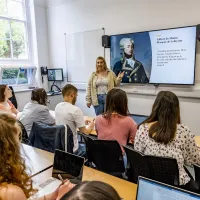
English and History
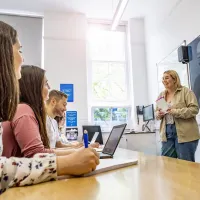
English and History with Year Abroad
Film and History
Film and History with Year Abroad

History

